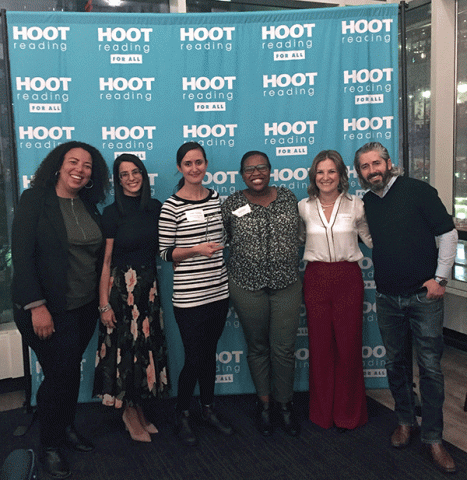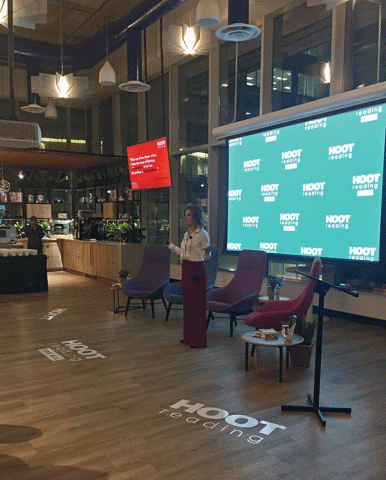
The cost is normally $125 (USD) a month. Each child selected by Boys and Girls Clubs Canada receives a minimum of 12 sessions, however many receive more.
The Hoot Reading app, in business for two years and geared towards kindergarten to grade 4 as well as struggling readers of all ages, allows online tutoring where the kids interact with real teachers via a digital screen.
"Our kids meet with a real teacher over the app, which is Facetime meets Kindle. The child and teacher hear one another over video chat. And they share a library over 500 books that are synchronized during the call, enabling the teacher to follow the child as they read. One side holds up the book and the other sees it," Hoot Reading CEO and co-founder Carly Shuler tells Samaritanmag.
The tutors are all qualified, certified teachers, located throughout the U.S. and Canada, and paid by Hoot Reading.
All teachers must meet the company’s standard qualifications — including a Bachelor degree in education or equivalent, and a minimum of one-year classroom experience — and go through a four-step selection process, which includes two interviews with its team and a background and abuse registry check.
Shuler says the app works because it mirrors the classroom experience in part: "It's really tapping into regular teaching. We believe that humans are such an important part of the equation. For so many apps, they have a child interacting with a piece of software. For us, we have a child interacting with a real teacher, which we know works."
The Hoot Reading app is available to 700 Boys and Girls Clubs, where its mission is "to provide safe, supportive places where children and youth can experience new opportunities, overcome barriers, build positive relationships, and develop confidence and skills for life,” it reads on the web site.
The organization that pairs kids with adult mentors offers after-school and pre-employment programs, youth sport programs, intervention for kids facing mental health issues, and scholarships for post-secondary education.
The Hoot Reading For All initiative will help kids raise their skills to move ahead in all other learning subjects and life itself.
Schuler says the Hoot reading app is backed up by scientific research to assure its efficiency. "We did a research study (with NYU) that included a randomized trial with kids in inner-city New York and found that kids who did Hoot reading in only 10 sessions had gained three times more than kids who did not."

"When we look at a classroom, the top third don't have any reading issues so they develop a lot of confidence and they love reading. For the remaining two-thirds of kids, we often say reading is a skill, it's not a milestone. That means reading comes easier to some than others.
"For the rest of the kids, if they had frequent practice, with the help of a teacher, they would be able to be at grade level. But for so many, they become a reluctant reader, where they don't want to practice and they drop (academically).”
Shuler explains the bottom third of a class, where reading is most difficult among students, may see a child get noticed for failing to read well if, for example, they are dyslexic. "Usually those kids will be identified and will have some intervention. But that doesn't always happen in an ideal world. It's that middle third of a classroom that's a concern. Usually it's not noticed. It's not that they're not literate. They aren't reading at a fluency level.
“The grade four fluency level is key, as that's where kids leap from learning to read to reading to learn for academic performance,” she says. "We talk a lot about coding and math. But reading at its core is the bridge to all other learning. By grade 4, many kids are reading below where they need to read to learn. They're not able to do as well in the rest of their subjects.”
Here practice makes perfect: "Practicing with real teachers is the best way to gain a skill. If you're learning, say basketball and you have frequent sessions with someone who knows how to teach you basketball, you'll get better.”
She sees no need to choose between books and screen time for kids, or reducing screen time overall. The solution is changing how kids use screen time "It comes down much more to what kids are doing on those screens, not the fact that they're on them at all," she argues.
Shuler also touts the benefits of deep reading, where take time to understand the text on a page or screen.
"We do think that kids need to do the quick skimming and switching that comes with reading online, but we also believe kids need to be able to do the deep reading that comes with reading a book, or a novel or a piece of non-fiction. That's something kids are doing less and less. There's just a lot of choice these days and we need to make sure books are picked up as part of those choices.”
Another factor hindering reading skills is kids not seeing their own parents reading books.
"In the same way kids model what we do, if they see parents that read a lot, both for information and pleasure, they will see that as something they espouse to do as well. It can be challenging for parents. We may be reading after the kids go to sleep, or we may be reading on a device and the kids don't know that.
The solution is parents making reading a part of their daily interaction with their children.
"Talk about the books you're reading. Share stories from them. Tell your child when you're on a device, ‘This is the book I'm reading, and this is the book you'll be reading, and this is what's it's about,” she says. “Being a reading mentor will go a long way towards helping your child become a better reader. If we want to raise kids who can think larger and form their opinions, then we really need to ensure we're raising kids to care about reading.”
(Please support Samaritanmag's original journalism by making a PayPal contribution or EMT transfer using info@samaritanmag.com so we can increase the amount of content and writers we hire. Samaritanmag is the anti-tabloid, covering good people trying to change bad things. Let's make this thing bigger than TMZ.)
Air Jordan 1 Retro High OG "UNC Patent" Obsidian/Blue Chill-White For Sale